Papers by Gisele M P Tracera
Revista Enfermagem UERJ, Nov 10, 2021
Alinhamento e satisfação no trabalho e a relação com adoecimento dos enfermeiros Alignment and jo... more Alinhamento e satisfação no trabalho e a relação com adoecimento dos enfermeiros Alignment and job satisfaction and the relationship with illness among nurses Alineamiento y satisfacción laboral y la relación con enfermedades de los enfermeros
Revista gaúcha de enfermagem, 2022
Fatores associados ao presenteísmo em profissionais de enfermagem ambulatorial Factors associated... more Fatores associados ao presenteísmo em profissionais de enfermagem ambulatorial Factors associated with presenteeism in outpatient nursing professionals Factores asociados al presentismo en profesionales de enfermería ambulatoria
Revista Da Escola De Enfermagem Da Usp, 2022
*Extraído da tese: "Fatores de riscos psicossociais e dimensões do trabalho em profissionais de e... more *Extraído da tese: "Fatores de riscos psicossociais e dimensões do trabalho em profissionais de enfermagem de ambulatório universitário",
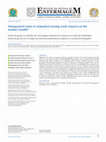
Revista Da Escola De Enfermagem Da Usp, 2022
Objective: To analyze management styles in outpatient clinics of university hospitals and their i... more Objective: To analyze management styles in outpatient clinics of university hospitals and their impacts on the nursing workers' health. Method: Quantitative, cross-sectional study with 388 nursing professionals working in 11 outpatient clinics linked to public universities in Rio de Janeiro. The Management Styles Scale, the Pathogenic Suffering at Work Scale, and the Work-Related Physical and Psychosocial Harms Scale were used. Results: The managerial and collective management styles showed a moderate presence for the outpatient clinics nursing staff. The characteristics of the predominantly managerial management style, evidenced by the lack of participation in decision-making, the strongly hierarchical work, focused on norms and control, acted as predictors of the experiences of suffering and of the physical, psychological, and social damages presented by the professionals working in this context. Conclusion: The analysis of management styles allowed elucidating characteristics that have the potential to negatively impact the workers' health, highlighting the need to review the management models currently adopted for the outpatient nursing team.
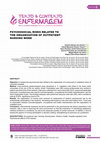
Texto & Contexto Enfermagem, 2022
Objective: to analyze the psychosocial risks related to the organization of nursing work in outpa... more Objective: to analyze the psychosocial risks related to the organization of nursing work in outpatient clinics of university hospitals. Method: cross-sectional epidemiological study developed in 11 outpatient units linked to the three public universities of the city of Rio de Janeiro, Brazil. Participants were 388 nursing professionals who worked in patient care at the time of the research. Data were collected from July to December 2018, using a self-applicable instrument. A questionnaire was used for sociodemographic, occupational and health characterization, and the Work Organization Scale. The bivariate analyses were performed using the odds ratio (OR), with a confidence interval of 95%, significance level of 5%. Results: the organization of nursing work received an assessment of medium psychosocial risk by the professionals participating in the research, demanding interventions in the short and medium term. There was no association between sociodemographic, occupational and health characteristics and the organization of outpatient work. Conclusion: interventional measures should be performed in the psychosocial risk factors presented in this research, with a view to improving the work environment, so that the importance of maintaining satisfactory material conditions is considered, as well as the adequate quantity of human resources. In addition, it aims to expand the spaces of nursing participation in decision-making, strengthening its autonomy as a profession.
Rev. Pesqui. (Univ. Fed. Estado Rio J., Online), 2021
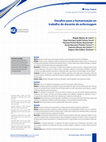
Revista Gaúcha de Enfermagem, Dec 12, 2020
RESUMO Objetivo: Discutir os desafios para a humanização no trabalho, a partir da percepção de do... more RESUMO Objetivo: Discutir os desafios para a humanização no trabalho, a partir da percepção de docentes de enfermagem. Método: Pesquisa descritiva, exploratória, qualitativa realizada em uma universidade pública no Espírito Santo, com 19 docentes de enfermagem que responderam a entrevista semiestruturada. Utilizou-se a análise temática para o tratamento dos dados, constituindo duas categorias: relacionamento interpessoal e organização do trabalho. Resultados: Os desafios para a humanização no trabalho foram pautados nas questões relacionais e sobrecarga laboral. Quanto às relações interpessoais, destacaram-se a falta de respeito e de diálogo e problemas de relacionamento. Referente à organização do trabalho, esta englobou questões relacionadas ao conteúdo das tarefas, carga horária, excesso de atividades e pressões laborais. Conclusão: Os elementos relacionais e a organização do trabalho se apresentam como desafios para a humanização, repercutindo na saúde do docente e interferindo na organização de espaços de trabalho saudáveis e acolhedores, contrariando a Política Nacional de Humanização. Palavras-chave: Trabalho. Enfermagem. Docentes de enfermagem. Saúde do trabalhador. Humanização da assistência.
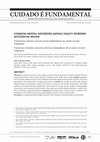
Revista de Pesquisa : Cuidado é Fundamental Online, Mar 9, 2021
Objectives: to identify and discuss the variables associated with the presence of Common Mental D... more Objectives: to identify and discuss the variables associated with the presence of Common Mental Disorders among health workers and to classify the level of evidence for the health of the worker. Method: integrative review of studies published in the LILACS, PubMed and CINAHL databases between 2011 and 2015. The search and selection were performed by two independent reviewers. Results: the variables associated with Common Mental Disorders among health workers were related to personal, work and life characteristics and health conditions. The analysis allowed to identify that, of the 10 selected, six associate the variable sociodemographic characteristics with Common Mental Disorders. Nine studies associate this disorder with labor variables, while three with lifestyle and health conditions. Conclusion: knowledge of these results is useful as a subsidy for the management of the health work process, minimizing the impact of work on worker health.
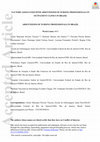
Journal of Nursing Management, Jul 9, 2020
Objective: To analyze the sociodemographic, occupational and health profile of nursing profession... more Objective: To analyze the sociodemographic, occupational and health profile of nursing professionals working in university outpatient services and their relationship with absenteeism. Background: The organization and working conditions in outpatient services may be directly related to the illness and absenteeism in the nursing profession. Method: Analytical cross-sectional study conducted in 11 outpatient clinics in the city of Rio de Janeiro/Brazil with nursing professionals. A self-applicable data collection tool was used for sociodemographic, occupational and health characterization. The analyses were performed using chi-square tests, odds ratio calculation and a 95% confidence interval. Results: Absenteeism due to illness in the previous 12 months was reported by 35.9% of workers. Sociodemographic and occupational characteristics were not significantly associated with absenteeism, having a positive association only among workers who had two or more jobs. In health-related variables, self-rated health was significantly associated with long absenteeism.
Acta Paulista De Enfermagem, 2022
Danos à saúde relacionados ao trabalho de enfermeiros em um hospital universitário Work-related h... more Danos à saúde relacionados ao trabalho de enfermeiros em um hospital universitário Work-related health damage of nurses in a university hospital Daños a la salud relacionados con el trabajo de enfermeros en un hospital universitario
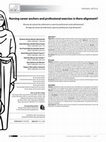
Revista Brasileira De Enfermagem, 2021
Objective: to identify the types of career anchors of university hospital nurses and alignment wi... more Objective: to identify the types of career anchors of university hospital nurses and alignment with current work, from the perspective of workers' health. Method: a descriptive and quantitative study, developed in a university hospital with 135 nurses, from December 2018 to February 2019. The Career Orientations Inventory was used as an instrument and an instrument to assess the alignment of career anchors to the current job. Results: it was identified that the most frequent anchors were: Security/Stability, Service/Dedication to a Cause, and Lifestyle. Among nurses, 63.7% were not aligned with their career anchor. Conclusion: the alignment factor is not prevalent among nurses, demonstrating that most seek to meet their professional motivations, but do not find it in their current work, which can lead to physical exhaustion and psychological distress.
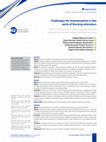
Revista gaúcha de enfermagem, 2020
Objective: To discuss the challenges for humanization at work, from the perception of Nursing edu... more Objective: To discuss the challenges for humanization at work, from the perception of Nursing educators. Method: A descriptive, exploratory, and qualitative research study conducted at a public university in Espírito Santo, with 19 Nursing educators who answered the semi-structured interview. Thematic analysis was used for data treatment, constituting two categories: interpersonal relationships and work organization. Results: The challenges for humanization at work were based on relational issues and work overload. Regarding interpersonal relationships, lack of respect and dialog and relationship problems were highlighted. Regarding the organization of work, it encompassed issues related to the content of tasks, workload, excess of activities, and work pressures. Conclusion: Relational elements and work organization are challenges for humanization, affecting the health of the educators and interfering in the organization of healthy and welcoming workspaces, contrary the National Humanization Policy.
Escola Anna Nery, Jun 18, 2018
Risk of illness and human cost at work in a psychiatric hospital a Risco de adoecimento e custo h... more Risk of illness and human cost at work in a psychiatric hospital a Risco de adoecimento e custo humano no trabalho em um hospital psiquiátrico Riesgo de enfermedad y el costo humano en el trabajo en un hospital psiquiátrico
Escola Anna Nery, 2020
Perfil da equipe de enfermagem de unidades ambulatoriais universitárias: considerações para a saú... more Perfil da equipe de enfermagem de unidades ambulatoriais universitárias: considerações para a saúde do trabalhador Profile of the nursing team of university outpatient units: worker health considerations Perfil del equipo de enfermería de unidades ambulatorias universitarias: consideraciones para la salud del trabajador
Revista Latino-americana De Enfermagem, 2020
Factors related to the risk of illness of nursing staff at work in a psychiatric institution*
Acta Paulista De Enfermagem, Feb 1, 2019
Common mental disorders among nursing workers in a psychiatric hospital Transtornos mentais comun... more Common mental disorders among nursing workers in a psychiatric hospital Transtornos mentais comuns entre trabalhadores de enfermagem de um hospital psiquiátrico Trastornos mentales comunes entre trabajadores de enfermería de un hospital psiquiátrico
Revista gaúcha de enfermagem, 2022
Factors associated with presenteeism in outpatient nursing professionals Fatores associados ao pr... more Factors associated with presenteeism in outpatient nursing professionals Fatores associados ao presenteísmo em profissionais de enfermagem ambulatorial Factores asociados al presentismo en profesionales de enfermería ambulatoria
Revista Brasileira De Enfermagem, 2020
Objective: To identify how nursing faculty perceive humanization at work; to describe the factors... more Objective: To identify how nursing faculty perceive humanization at work; to describe the factors that enhance humanization and its implications on the health of nursing professors. Method: This was a descriptive and exploratory study carried out at a Brazilian public university with 19 nursing professors who answered a semi-structured interview. Thematic analysis was used to process data, yielding three analytical categories. Results: The faculty indicated that humanization at work and the factors that enhance it are associated with interpersonal relationships, including dialogue and respect in work relationships, positively impacting their health. Final considerations: The effective achievement humanization at work is a possibility that generates health and wellbeing for nursing faculty.







Uploads
Papers by Gisele M P Tracera